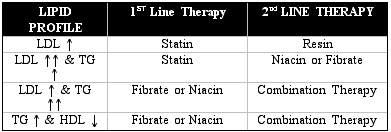Cardiac Medications
Cholesterol and Lipid Lowering Drugs
These drugs are used to treat abnormally high levels of one or more types
of fats such as cholesterol or triglycerides. These drugs are given to
reduce the risk of atherosclerosis (hardening of the arteries) usually
when dietary and other measures have not worked. In patients with coronary
disease, cerebro-vascular disease (strokes or TIA’s), peripheral
vascular disease, abdominal aortic aneurysm and diabetes, aggressive lowering
of total cholesterol and LDL cholesterol (the “bad”) cholesterol
have been shown to reduce the risk of heart attack and stroke by as much
as 30-50%.
In general cholesterol lowering agents are started early in patients with
CAD. Modern medications are very effective in lowering cholesterol with
minimal side effects. When initiated in patients with CAD and other manifestations
of atherosclerosis, they should be continued indefinitely.
Classes of Lipid Lowering Medications:
Statins
Fibric Acid Derivatives
Niacin
Cholesterol Absorption Inhibitors
Cholesterol Binding Resins
These drugs differ with respect to mechanism of action and degree and
type of lipid lowering. In general, cholesterol can only be lowered about
10-15% by diet alone and it is difficult to adhere to a diet consistently.
All patients should adhere to a low cholesterol diet. In many cases additional
lipid lowering with medication will be required. If required, these medications
are best initiated early to attain maximum benefit as soon as possible.
If diet alone is sufficient in the long term, the dose of lipid altering
medication may be reduced or the medication discontinued entirely. Most
often patients on lipid lowering medications for CAD will have to remain
on these medications forever. This will ensure that the coronary disease
will progress as little as possible and may even regress (get better).
The choice of agent depends on the lipid abnormality:

|

